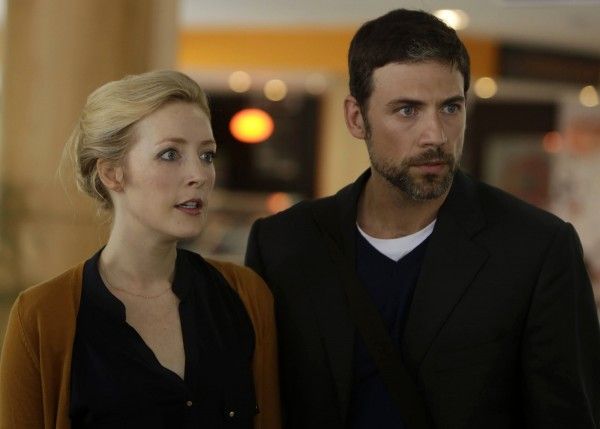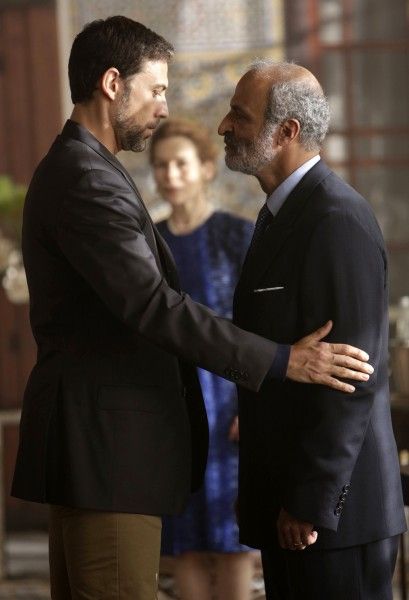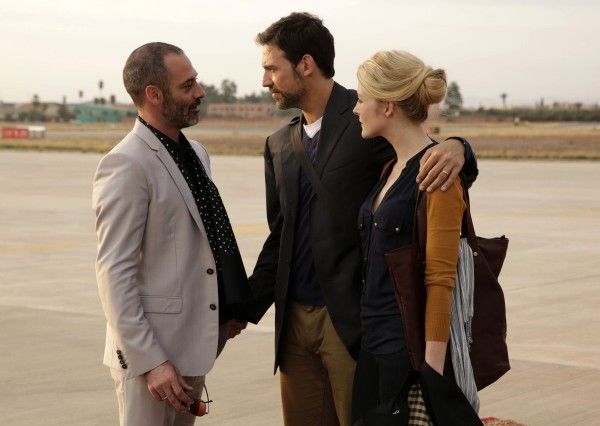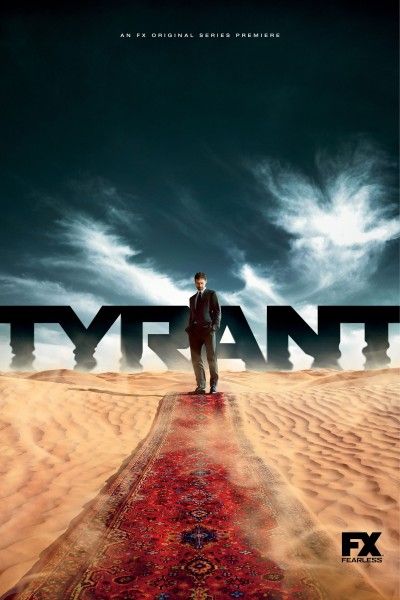From showrunner/executive producer Howard Gordon (Homeland, 24), the FX drama series Tyrant tells the story of Bassam “Barry” Al-Fayeed (Adam Rayner), the younger son of the dictator or a war–torn Middle Eastern nation. When he ends a self-imposed 20-year exile to return to his homeland with his American wife (Jennifer Finnigan) and children for his nephew’s wedding, he is immediately thrown back into the politics that he left behind.
During this exclusive interview with Collider, actor Adam Rayner talked about how he came to be a part of this show, why he was unsure about playing an Arab character as a British actor, how he views his character, the shocking moments, the relationship between brothers, shooting the pilot in Morocco, and the motives behind his character’s decision to return home after 20 years. Check out what he had to say after the jump, and be aware that there are some spoilers.
Collider: First of all, I have to say that I really enjoyed Hunted.
ADAM RAYNER: Oh, did you? Thanks! That show was unlucky, in a way. In almost any other circumstance, it would have continued, certainly on Cinemax. They immediately wanted to do more, but the nature of the deal with BBC meant that it couldn’t go. But, I believe that Frank [Spotnitz] and Melissa [George] are developing a spin-off.
How did Tyrant come about?
RAYNER: I just got sent the script. I tend to be the solution to problems. I’m never the first person they come to. So, I got this script, and the character was an Arab in his 40s, and I just laughed and phoned my manager and said, “This is a waste of time.” And she said, “No, they’d like you to put yourself on tape for it.” I was literally hopping around my hotel room with a broken ankle – I had just broken my ankle, trying to be the bad guy in a Taylor Lautner movie – and I was trying to film myself while my girlfriend was reading the other lines on an iPad from London. It was crazy. But as soon as I read the script, apart from the fact that I thought there was no possibility of me getting the job, I knew that it was the one that we were all waiting for. If we do it right and people respond to it, this is the job that we all slog away for, for 10 years, to come along. It was a fabulous script and the character has such potential to be mined very deeply for so much.
And this is also a show that will spark conversation.
RAYNER: Yeah, exactly! It’s not just another cop show procedural. It’s something that could potentially be controversial, and is very apposite, as well. It’s amazing when your dreams come. If I could have chosen any show, this would have been it.
Were there nerves about the fact that you weren’t the description of the character?
RAYNER: Yeah, but it was dealt with very quickly, in the sense that there are Arabs that look like me. The Alawites often have blue eyes and light skin. Even beyond that, we’ve made it a part of the show and something of narrative interest, later on in the show. It was a mixed marriage. My character’s father married an English woman. And then, with the age thing, I’m a very young-ish looking 40-something. That’s TV, I guess.
Was part of the attraction to this the fact that Howard Gordon is so good with strong male characters?
RAYNER: Yes. Everything was good about this project. I was just thrilled to be invited to the party. Having seen, at close hand, how hard it is to get things right, I’ve come to see why he has had the success that he has.
What can you say about who your character, Barry Al-Fayeed, was before we meet him in the show?
RAYNER: He’s spent the last 15 years, or whatever, just being a doctor. Nothing fancy, he’s just a local pediatrician. He hasn’t got some huge private practice. He’s just an ordinary doctor with a wife, two kids and a dog. But, there’s obviously more to it than that. In pursuing this very archetypically Western life, he’s clearly running from something. And as the show progresses, we begin to see that, in a very real sense, he’s running from himself and his true nature, which is inextricably linked to the country he comes from. He never wants to go back there because it unlocks parts of himself that he’s desperately trying to keep at bay.
There are definitely some shocking moments, especially when you see one of the things he’s probably running from and the actions he took as a child. Did you see any of that coming from, while you read it?
RAYNER: No, that was a shock. I knew it must be going somewhere, and the title is a clue, but I was shocked. And then, even having read it and been in it, I was surprised when I watched it. There were things that I wasn’t expected from this guy. There’s plenty of stuff that I would have changed about my own performance, but it pleased me that there were surprises. That was good.
What can you say about the relationship between Barry and his brother, Jamal?
RAYNER: I feel like it might become the central relationship of the show. It’s deeply complex. It’s Cain and Abel stuff. They love each other. They hate each other. They rely on each other. They are rivals to each other, politically and sexually. And that’s tough to play. At any given moment, we tend to know what we’re doing with someone, or at least we think we do. It’s tough when you have a broad sweep of ambiguity in a relationship when you’re acting because you can’t just play nothing. You’ve gotta choose something, so it’s tough. But, if you can find your way through it, it is ultimately what real life is like. We rarely just hate people or love people. Normally, the people we have moments of the most impassioned hate for, it’s because we love them so much. The Barry-Jamal relationship is all of that complexity and passion, and it could go either way. They could form an unstoppable alliance or they could tear each other apart. It’s very primal. It’s very who’s the Alpha? At what point does Barry cease to see himself as subordinate, in some way, to his brother, and at what point does he consider himself to be the dominant force and the right man for the job. That’s great stuff to explore.
How was the experience of shooting this pilot in Morocco?
RAYNER: It’s an incredibly rich place to drop into and film in. I’ve never been to the Middle East, but I assume it has a similar flavor. In Tangier, you’re 20 miles from Spain. We shot a bit of Hunted in Tangier, and you are in a very, very different world. It’s very difficult to blend in over there. That sense of alienation, which was less relevant for Barry, but certainly for his wife and kids, it was perfect to dump them in that place, and then shoot this stuff because that was the situation they were in.
Did Barry’s family know anything about his family’s history?
RAYNER: The way we’ve envisioned it is that, in not wanting to explore these parts of himself, he puts it away in a box and locks it away, in a typical male, uncommunicative fashion. They’ve met, but in terms of the true nature of the dynamics and what went on when he was a boy, he wouldn’t have brought them into that. That creates problems in the marriage because his wife feels very much left out of that part of his life and history. And then, she begins to realize that there are perhaps unresolved feelings with this woman from his past. It’s all good stuff. It’s quite soapy, in the best possible way.
Do you think Barry really believed that he’d just go home to visit his family for this short amount of time, and then he’d go back to America and that would be it?
RAYNER: That’s a very good question, and maybe I don’t need to answer that. Obviously, he could have put his foot down and said, “Absolutely not! We’re not going.” But for some reason, he chose to acquiesce and go. Why did he do that? Maybe it is a self-fulfillment. There’s a sense in which he has to play it out and find out what his destiny is. Sometimes our motivations can be quite hazy, contradictory and multi-faceted, in real life, so I think it’s okay for that ambiguity to exist. We kid ourselves, and Barry is kidding himself about a lot in his life and hiding stuff within himself. He’s more likely than anyone to try to tell himself a story.
Tyrant airs on Tuesday nights on FX.





